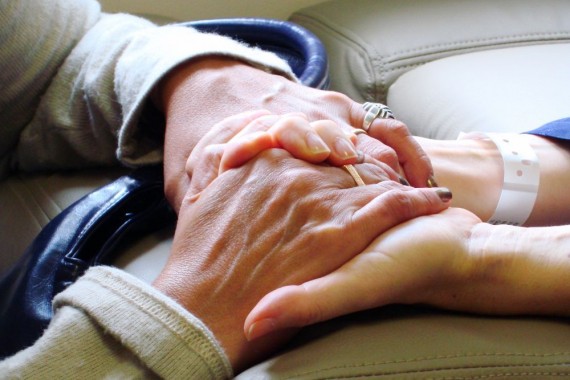 Bear with me. I’m going to get really personal.
Bear with me. I’m going to get really personal.
My husband and I have a beautiful 4-year-old son and have wanted to expand our family for a while. When we finally got that positive pregnancy confirmation, I was elated and started planning for our new arrival that I expected to come in the spring.
While almost 10 weeks pregnant, I had an ultrasound that confirmed that my baby had stopped developing early on in the pregnancy and a miscarriage was inevitable. I’ve read that as many as 30% of pregnancies end in miscarriage, making miscarriage very common; however, that statistic didn’t make the experience any easier or less heartbreaking.
As sad as I was, and despite the feeling of loss, I felt peace, and I truly knew my Heavenly Father’s love for me. Most often, at least for me, His love is manifested by those around me.
Most of my family and friends didn’t even know I was pregnant. However, I told a couple of close friends about the pregnancy and had to ultimately tell them I was no longer expecting. The next day, two of my friends showed up at my door with my favorite Roxberry smoothie and some cake. They just hugged me, told me they were sorry, and handed over the goods. It was simple, but so thoughtful, and the support and love was exactly what I needed at the time. I know they were inspired.
When those you love suffer a loss, whether it is the death of a family member, a miscarriage, or even divorce, you might not know what to do or say. Here are some other things I’ve learned from experience of what to do or not do when someone you know is grieving:
Now is not the time to be Johnny One-Up.
What not to say: “Oh, you had a miscarriage? I totally know what that’s like because I’ve had 4.” Suddenly, now I feel horrible about even feeling sad about my situation. It doesn’t even compare.
You may just be trying to help and relate, but be cautious about minimizing someone’s pain and grief. “One-upping” someone with your experience is generally not helpful and can make someone feel guilty for grieving.
Try to avoid “making it better” with your words.
This goes along with what I said above. Don’t minimize anyone’s grief by saying things like, “It was meant to be” or “It was their time to go” or “Be glad the baby didn’t live because it probably would have been deformed.” Maybe it’s true, but it can make the person feel like they shouldn’t mourn. After experiencing loss, many people will feel sad, angry, depressed, and they should be allowed to feel those feelings. So, what SHOULD you say? Something like “I’m so sorry” or “I’m here if you need anything” or “I’m thinking of you” and “I’m praying for you” are totally appropriate. It’s even okay to say, “I don’t know what to say.” It’s better than putting your foot in your mouth and saying something inappropriate.
Never, ever judge someone who is grieving.
Everyone grieves differently. Whether you’ve experienced something similar or not, you are not in a position to judge others, their actions, or their reactions to the things that happen to them. Just be as compassionate as the Savior would be, and love those that are grieving.
Don’t expect a call when you say, “Let me know if there’s anything I can do.”
Of course you want to help, but many people won’t reach out for it. Pray for inspiration. Then, follow the promptings you receive.
Some things you can do if you’re unsure how to help:
- Take them a treat, dinner, flowers, etc. I recently heard a talk about a family who had experienced a death in the family who received a cooler of drinks at their door. With so many visitors coming to their home, this was exactly what they needed.
- If they have younger children, offer to take them for an hour or so to allow some private time.
- Consider asking them if you can inform others of their loss. It can be an awkward situation for someone to repeatedly have the same conversation with a bunch of different people. If people are aware of a pregnancy, it can be exhausting to repeatedly explain that you are no longer expecting. Also, I’ve been the person who had to call friends and family members to inform them of the death of a spouse. When it comes from the spouse, mother, father, etc., it can be a really difficult and sometimes awkward conversation to have – especially more than once. This is NOT an easy task though, so be prepared if you ask to do this.
- Offer a listening ear. Don’t be afraid to call just to listen.
- A simple note, card, text message, or email can help lift someone’s spirits.
- Clean their house. This might be a sensitive issue for some. Some people may not be comfortable with this, so it’s important that you follow the promptings of the spirit if you plan on doing something this personal. With that said, I’m not one that would ever voluntarily allow someone to come clean my house (it’s a pride issue, really), so when my husband died, my friends just cleaned my house and did my laundry without telling me. I thought I would be more embarrassed than I was. But frankly, I was more thankful than anything.
Following the example of the Savior is the best route you can take when comforting those who are grieving. Genuine compassion and love can help ease the pain of people who are suffering from a loss.

I agree, it can be difficult to comfort those in the midst of grief or pain. One thing I remember from the difficult days after my dad’s death, was a close friend of my mom sitting with me while she reminded me to eat. “Take a bite of this….. Ok how about some of this….” It was a small thing really, butI know she was inspired to find a way to help, and now 20 yrs later -she did t even remember it when I brought it up, at a visit. To her it was a small reaction to inspired thought, to me it was huge, proof that I was not alone, that someone cared about me not just felt sorry for me. Small and simple acts can have the greatest impact on those who are grieving.